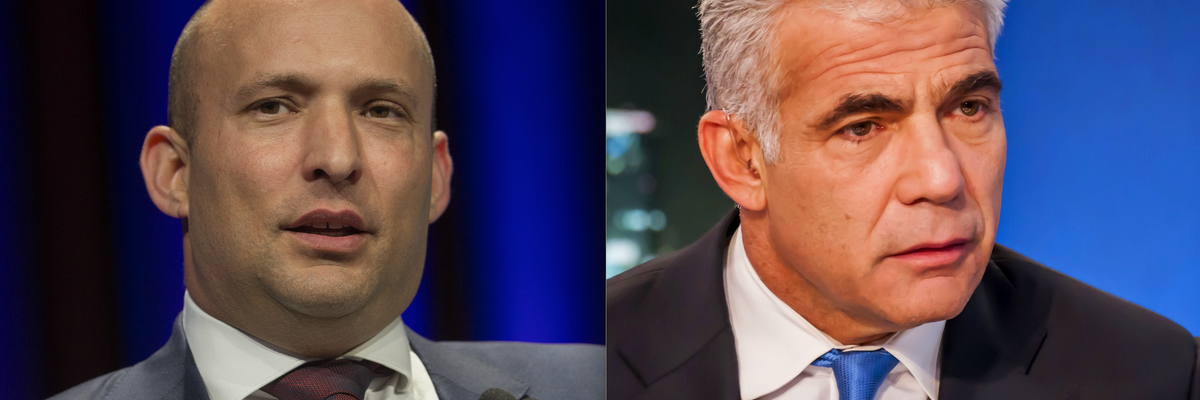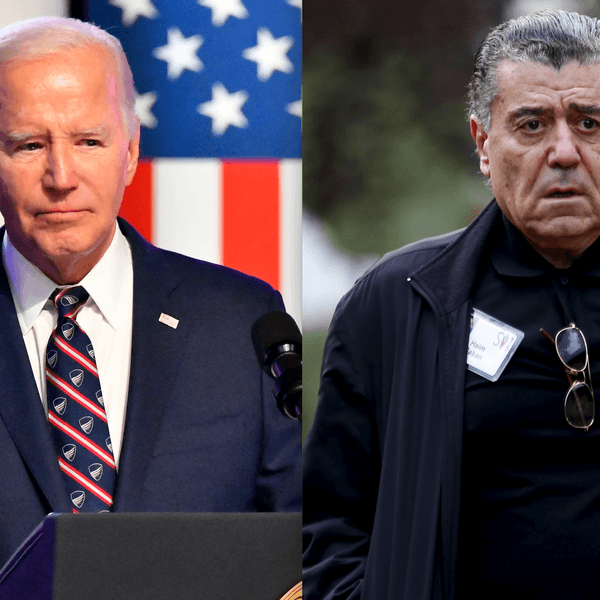UPDATE 6/3: The opposition has announced the formation of a new government, but the Knesset has to make it official with a vote, which, according to reports could take place over the next 12 days.
***
The end of the Benjamin Netanyahu era in Israel is closer than ever.
When right-wing leader Naftali Bennett announced last weekend that he was joining the so-called “anti-Netanyahu” coalition, a wide spectrum of the Israeli political landscape had come together, with centrists joining with a conservative Arab party, the left-leaning Zionist parties, and three distinctly right-wing parties.
This coalition has only one thing in common: getting Netanyahu out of the Prime Minister’s Office.
It seems likely that this government will have a razor-thin majority of 61 of the Knesset’s 120 seats. It’s not absolutely certain that the proposed new government can hold enough members together to win a vote of confidence that represents the final approval needed to swear them in. But assuming that they do, the government will be the most unstable in Israel’s history. It came together to oust Netanyahu and only preventing his return will keep them together.
The new government would be headed by Bennett, a staunch right-wing leader who commands only seven seats in the Knesset. He would hand the reins over to centrist Yair Lapid of the Yesh Atid party halfway through the new government’s term, in the unlikely event it lasts that long.
All of this will present new challenges to the Biden administration which, after the recent Israeli airstrikes in Gaza and Hamas rocket fire into Israel, seems to have recognized that the president cannot simply ignore Israel and Palestine.
Bennett is even farther to the right on the issue of the Palestinians than Netanyahu. Unlike Netanyahu, he has never even paid lip service to a two-state solution. He has consistently, adamantly, and unambiguously opposed it. Given that the pro-Netanyahu right is already accusing Bennett of being a traitor and — worse in Israeli right-wing parlance — a leftist, he will not want to appear to be conciliatory as Netanyahu’s replacement.
On the contrary, Bennett intends that his time as prime minister will serve as an audition for the role of new leader of the Israeli right. This will entice him to take a tougher stance against even the smallest pressures from Washington.
But Bennett’s partner, Yair Lapid, has a much stronger relationship with the United States and, crucially right now, with the Democratic Party. He is likely going to try to rebuild that relationship and re-establish the bipartisanship in Washington that has, for so long, precluded a serious examination of the merits of U.S. policy toward Israel and Palestine. If he succeeds, the chances of a serious debate over U.S. policy in the region will diminish.
Lapid is close to the staunchly pro-Israel group, the Democratic Majority for Israel. DMFI’s president, Mark Mellman, is a long-time Democratic pollster and strategist and one of the key figures in Lapid’s rise to prominence in Israeli politics back in 2013. The group — which is well connected in the party and has led the fight against progressives such as Bernie Sanders and Ilhan Omar calling for a reassessment of U.S. policy — has recently faced accusations of severe anti-Arab racism.
Lapid ostensibly supports a two-state solution, but also has stated that he believes Jerusalem should be the undivided capital of Israel. He recently criticized a planned settlement expansion but also once kicked off an election campaign in a settlement.
This sort of duality means Lapid is well-suited to be the main face of Israel in Washington. He will appear to be a representative of a hardline government, but also a moderating influence that will be much easier for Biden, Secretary of State Antony Blinken, and other officials to embrace and present as a partner.
The problem will be that the actual policies, especially on the ground in the West Bank and Gaza Strip, will not change much with Bennett or Lapid in office, despite the vast ideological gulf between those two and the fact that both of them are quite different figures from Netanyahu.
The new “government for change” will continue expanding existing Israeli settlements in the West Bank. It will continue the siege on the Gaza Strip. It will continue the push to ensure that Jerusalem remains undivided and exclusively Israeli. It will continue to oppose the United States’ re-entry into the Iran nuclear deal.
There will, undoubtedly, be some points of friction between Lapid and Bennett. They may disagree about how to respond to a revived Iran deal. They may differ about building up a particularly sensitive settlement bloc, or perhaps some punitive measure regarding Gaza. But the real points of friction are more likely to be domestic issues, such as those involving the judiciary, the educational curriculum, and decisions about resource allocation.
The Biden administration is going to be tempted to try to wrangle peace talks out of Bennett and will have an ally in that effort in Lapid. But with this government, headed by two men with vastly different ideologies and long-term goals, any talks between Israel and the Palestinians are even more likely to be futile than they were under Netanyahu. The only thing that can change that is significant pressure on Israel from the United States and Europe.
Moreover, the fragile nature of this government will be an excuse for Washington to avoid pushing the Israelis too hard, fearing the collapse of the Israeli coalition. Any political capital Biden spends on Israel in the near term, and any risk of putting too much pressure on Israel, will be reserved for reviving the JCPOA, not ending the Israeli occupation.
Sensitivity to Israeli politics is a familiar refrain from Washington, one which is routinely applied to Israeli political concerns but far less often to that of the Palestinians. The lack of similar concern for Palestinian politics is a major contributing factor in Palestinian President Mahmoud Abbas’s loss of stature among Palestinians, who now widely believe his faith that the United States would eventually push Israel into ending its occupation was naïve and foolish.
But despite the view of many observers that Biden is playing from an obsolete playbook, Netanyahu’s departure and the prominent presence of Yair Lapid in the new government will present him with an opportunity to keep trying to make it work.
Instead, Biden should use this opportunity to make it clear that the United States wants to see a resolution to this issue that is consistent with the language of “equality” that the Biden administration has leaned heavily on these past weeks. But that will only be possible if progressive Democrats work to both maintain and expand their list of allies on Capitol Hill and within the party pressing for a change in the failed U.S. approach.
During the attacks on Gaza we saw as staunch an Israel supporter as Sen. Bob Menendez question Israel’s tactics; House Foreign Affairs Committee Chairman Gregory Meeks was prepared to request a hold on the sale of arms to Israel; and more than half the Senate Democratic caucus called on Biden to press harder for a ceasefire regardless of Netanyahu’s desires. These were all signs that the debate over U.S. policy was finally beginning in the Democratic Party. That debate must not only continue but intensify if we hope to avoid more scenes like those we’ve seen recently in Gaza and Jerusalem.















